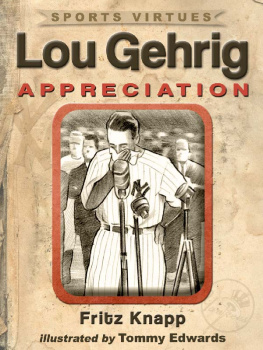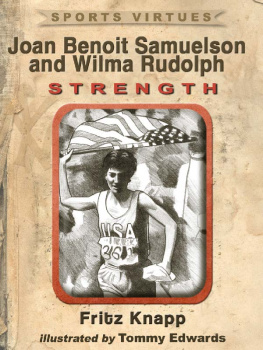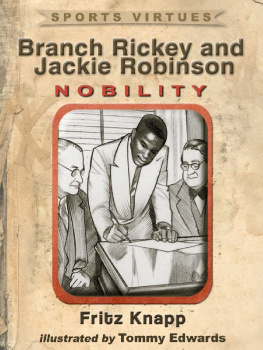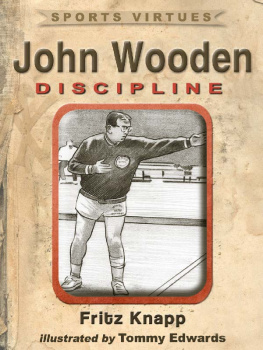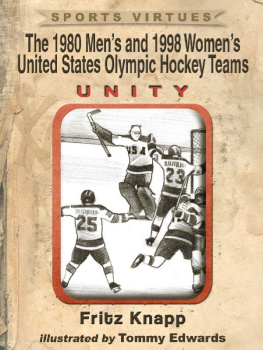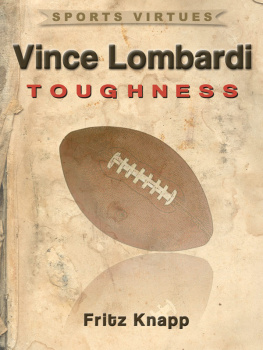Price World Publishing
www.PriceWorldPublishing.com
Scripture quotations are from the New Revised Standard Version Bible, copyright 1989 by the Division of Christian Education of the National Council of the Churches of Christ in the USA. Used by permission.
Copyright 2012 by Fritz Knapp
All rights reserved. Neither this book, nor any parts within it may be sold or reproduced in any form without permission.
Illustrations by Tom Edwards
Edited by Michael Wilt
eISBN: 9781619840348
Introduction
Their nicknames often seem to point to triumph: The Iron Horse, Captain Clutch, The Dominator, Mr. October, The Rocket, The Sultan of Swat, Air Jordan, Dr. J. But the true stories of many sports stars are much like those of any other human being. We all must, at some time or another, work and strive to overcome trouble, problems and hardship. Most of us do so on a smaller stageno lights, cameras, announcers, or postgame interviews. But there is much we can learn about how to live our own lives by studying the stories of great athletes who have overcome hard times and adversity.
The main characters in this series are well-known athletes and sports figures, men and women who have overcome personal misfortune through strength of character. Their stories inspire greatness in others. About ten years ago, I began to study athletes and the qualities that made them great. I was interested in more than their athletic abilities, impressive as those are in individuals who have made it to the top of their games. I was especially interested in their life abilities, the way they dealt with the variety of setbacks and struggles that all human beings encounter. In my study I read sports biographies by the dozens, and not just those of the most recent superstars. My reading took me as far back as the late 1800s. I found truly captivating accounts of athletes whose attitudes in their weak moments gave them more enduring legacies than they ever would have earned in athletic competition alone. As I entered some difficult personal times, these athletes became my friends and gave me a sense of hope that the struggles in my life would ultimately make me a stronger person.
I can personally identify with each athlete in this series. There is a part of me in every one of their stories. I have battled fatigue, failure and depression like U.S. Open golf champion Ken Venturi. I have had speech difficulties and low confidence like Amos Alonzo Stagg. My body has failed me at different times, as Gertrude Ederles and Lou Gehrigs bodies failed them. Despite lifes downside, though, I have been blessed with a source of strength that comes from deep within my soul and is a well-spring of incredible peace. This well has been fed, in part, by knowing otherssome personally and some through their storieswho fought hard to overcome their difficulties. My spirit has risen in the midst of trials, like an eagle in a storm soaring high above the mountains. But it is the Spirit that can turn tragedy into triumph, despair into hope, and defeat into victory. While the crises of life rage, Gods abundant grace is most present.
Each story in this series identifies a key personality trait demonstrated by a great athlete or sports figure in his or her struggle against adversity. Here you will read, for example, of the compassion of Gale Sayers and Brian Piccolo; the integrity of Arthur Ashe; the persistence of Althea Gibson; the wisdom of Happy Chandler. Through these and other stories, I hope you will find inspiration and a few new friends to help you along lifes journey. Get to know these people and you too will hear the lessons they teach. Let them be your mentors. Bring to your life the virtues described in these stories, and bring your own story into clearer perspective. Be true to who God made youa shining star in a dimming world. As St. Paul wrote, Adversity produces character, and character produces hope, and hope will not disappoint. Let adversity help turn you into the successful person God has created you to bea person of hope, a person of character.
APPRECIATION

Lou Gehrig
| APPRECIATION: Recognition of the quality, value, or importance, of people and things; a grateful attitude. |
B aseball, Americas national pastime, helps take peoples minds of their troubles. In search of someone to lift their spirits, Americans viewed Babe Ruth, the first mighty home-run hitter, as a source of strength. In Ruths shadow lived a man named Lou Gehrig, whose baseball skills equaled those of the Babe, but whose most noticeable traits were his positive attitude, courage and appreciation. His inner strength outshone even his outstanding baseball career, and his example breathed new life into a nation that was hungry for heroes.

Lou Gehrig was born on June 19, 1903 in New York City to German immigrant parents who spoke little English. Mr. Gehrig labored in the sheet metal industry but was often out of work. Mrs. Gehrig worked long, hard hours as a maid and cook to support her family. Lou, having learned the importance of hard work from his parents, held down odd jobs, such as selling newspapers in his neighborhood, to help support his family.
When he wasnt working or studying, he played sports. Mr. Gehrig encouraged his son to play soccer, at which he excelled, and then football. Lou Gehrigs size, strength, and speed gave him a distinct advantage in most sports, but especially football. He starred at running back and kicker. His father was disappointed when Lou began playing baseball because he thought it was not a good use of Lous athleticism and large body. But Lou Gehrigs baseball talents were immediately evident. At Commerce High School in upper Manhattan, he began to attract professional scouts with his monstrous home runs and high batting average (he batted over .500 in his high school career).
Mr. and Mrs. Gehrig always stressed education over sports. But a sports scholarship to Columbia University enabled their son to get the education they could not aford. Lou chose Columbia over the many schools competing for his baseball and football talents. It was close to home, and his mother worked there. His parents were thrilled and knew that with a Columbia degree Lou would certainly become a successful engineer, fulfilling their most fervent wish for him. Success, however, came in a diferent form.
Lou Gehrig received an ofer he couldnt refuse halfway through his college years. He accepted a lucrative contract with the New York Yankees, which paid him $3,000 annually and a $1,000 bonus. Gehrig gave much of the money to his parents, whose need he thought was greater than his own. Mrs. Gehrig did not like the fact that her son left school early to play baseball, but she certainly enjoyed his emerging fame as well as the security and ease provided by the money.
Lou spent almost two years with the Yankees minor league afiliate in Hartford, Connecticut, where he struggled at first, and even looked for other jobs, until he realized that baseball demanded his full attention. It took only a few months for Gehrig to begin to perform brilliantly on the field, and owner Jacob Ruppert, who had spent a fortune to acquire Babe Ruth from the Red Sox in 1918, was quick to see his star-quality talent. Gehrig wore Yankee pinstripes for the first time in 1923, but he did not break into the starting lineup until 1925. When he did, he broke in for good, and Ruth and Gehrig, batting third and fourth in the order, formed the backbone of a team whose hitters became widely known as Murderers Row for their cruelty to opposing pitchers.
Next page
